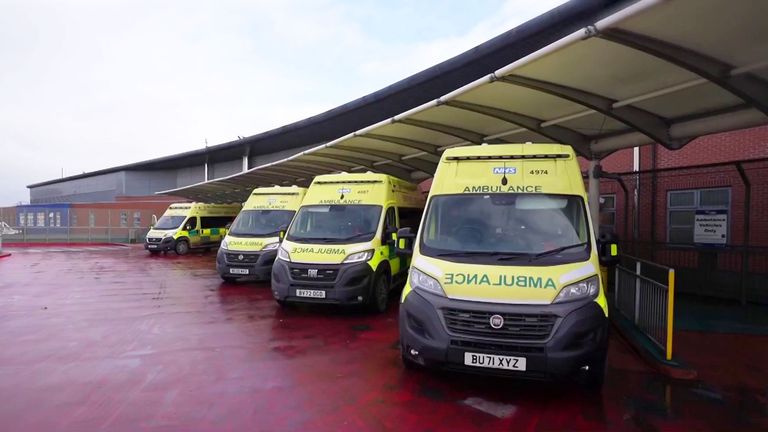NHS ambulance delays improving - but norovirus levels 'significantly higher' than last year
Bed occupancy rates also dropped in the week to 12 February although cases of COVID-19 continued their upward trend.
Thursday 16 February 2023 15:53, UK
An increase in norovirus cases is putting pressure on the NHS, even as ambulance delays ease.
Handover times from ambulances remain above NHS targets.
But the share of ambulance handovers in England taking more than 30 minutes averaged 20% in the week to 12 February. This was pretty much identical to the same time last year when they averaged 20.1%.
These are significantly higher than in 2021 (7.1%) or 2020 (12.3%).
The figures are similar for delays of more than 60 minutes, with the same week seeing 6.8% of ambulance handovers taking over an hour, way down from the winter peak of 26.4% during the week of 2 January.
This is an improvement over last year, when the week to 12 February saw 8.1% waiting over an hour but still much worse than 2021 (1.2%) and 2020 (2.1%).
Delays in patients being discharged from hospital also continued their downward trend with 13,122 people ready for discharge on 12 February remaining in hospital, the lowest number since New Year's Day.
Bed occupancy rates also improved during the week to 12 February.
An average of 6.2% of general and acute beds were free at any given time during that week, up from a low of 5.3% on the 10 January.
Norovirus 'significantly higher'
However, norovirus levels in England remain "significantly higher" than last year with hundreds of hospital beds filled by people with symptoms.
An average of 706 adult hospital beds were occupied last week by patients with diarrhoea and vomiting or norovirus-like symptoms, according to NHS data.
This is down 5% from 743 in the previous week but is nearly four times the number from this point last year.
Norovirus is the most common infectious cause of vomiting and diarrhoea and spreads easily through contact with someone who has the virus or with contaminated surfaces.
While most people make a full recovery within two or three days, the virus can lead to dehydration, especially among the very young, elderly or those with weakened immune systems.
Covid cases up but flu down
Some 7,209 patients were in hospital in England on 15 February who had tested positive for COVID-19, up 13% on the previous week.
The total had been falling since the start of the year, but this trend came to a halt at the end of January, with numbers rising ever since.
Read more:
Ambulance callers may be told to go to GP or pharmacist instead
'Cautious optimism' for NHS despite delays and cancellations
However, the number of flu patients in England has dropped for the sixth week in a row and has now fallen 86% since the start of the year.
Professor Stephen Powis, NHS national medical director for England, said: "The NHS prepared extensively for winter, including more call handlers, more beds and 24/7 system control centres to manage increased demand, and we will now build on that progress with our plan to help recover urgent and emergency services.
"Patients should continue to seek help when they need it, including using 111 online for minor illnesses or calling 999 in a life-threatening emergency."

